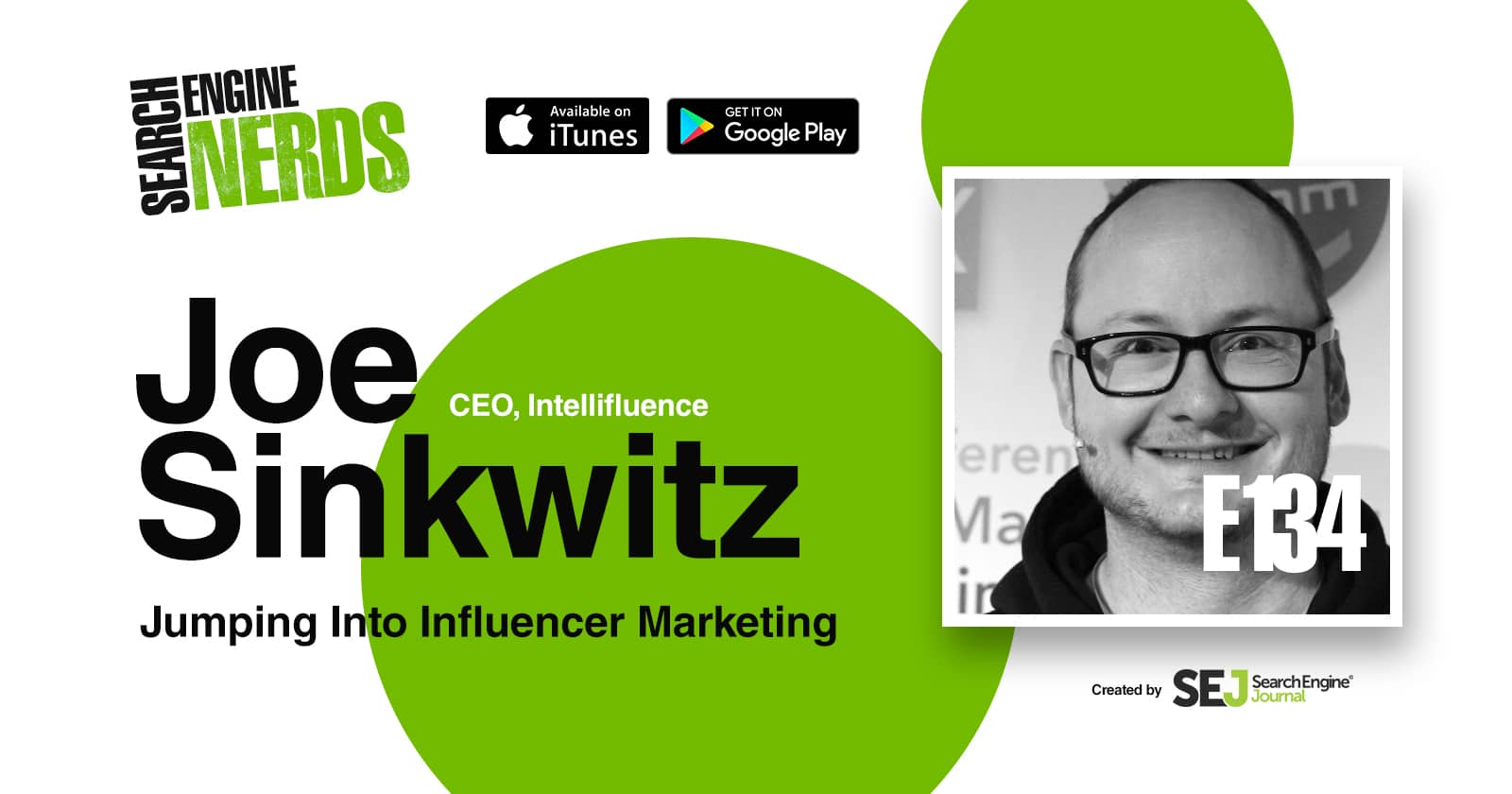Podcast: Download
Subscribe: Apple Podcast Google Podcasts Spotify
As new platforms emerge, influencer marketing continues to evolve. But can it really boost your product or service? How can you get it to work for your brand? Read on to learn more about using influencer marketing to generate more awareness and build your business in this Search Engine Nerds episode.
Joe Sinkwitz, CEO and co-founder of Intellifluence, joins me to share tips and learnings on how to make influencer marketing work for you. Sinkwitz also gives advice on strategies that will get you results and how to improve your success rate with influencer marketing.

What are some strategies you’ve been having success with when it comes to influencer marketing?
Joe Sinkwitz: Initially, when I got into influencer marketing, it was more for e-commerce reasons. I saw a big opportunity within e-commerce social media.
One of the first things I’ve noticed is some people will use networks like mine for social proof. What I mean by this is they’ll get an Instagram model to take a picture with the product and it doesn’t really matter to them at that point if they have sales. The whole point of this is to slather their site that’s selling their product with some of that social proof. So now it’s on a more personalized level.
Then, they’ll look for influencers that have a blog. This is where the intersection with SEO comes in. When you’re reaching out to a blogger for the purposes of influence, the success rate is significantly higher than if you just pitched them directly outside of an influencer network.
What I’m seeing is it’s almost like the evolution of the early days of text link ads. If we go way back, the immediacy and the ability to connect with the right parties changed the entire industry. I see it happening again now with these influencers.
So let’s say you have several thousand bloggers. If you’re hitting the right bloggers, you’re getting links, and it’s all organic material in terms of what they’re writing. We do recommend full disclosure.
Brent Csutoras: There has been a very big shift away from the previously prescribed format of influencer marketing. What we’re really talking about is going out and finding people who have an audience, who have an influence, who have some kind of sway in the discussion, and trying to get them to talk about a specific product or service to help get influence within that network.
What I’ve noticed is when you started out, it was with an SEO background. So you would get the whole, “Hey, can I give you $100 to say this? Can I get you to do this?” Of course, that was where the FCC and a lot of other people jumped in because people would recommend stuff they didn’t even like.
But now, I’ve seen a lot of focus on not trying to influence with money or pressure to get them to say something positive or negative, and really betting on the fact that most people don’t say negative stuff unless they’re really negative. Most of the time, if they like it, they’ll talk good about it. If they don’t like it, they just don’t talk about it at all.
JS: Absolutely. It’s a two-sided transaction.
You’re essentially doing a favor for some people, especially if they’re not making their living on their blog — they like getting free stuff. If they’re given a product, the overwhelming response tends to be positive, and by allowing them to write it in their own voice, it resonates significantly more with their audience.
A lot of our early days with influencer marketing had to do with finding the right people. It wasn’t even so much about the outreach aspect or the close ratio and funnels. Instead, it was more about who the right person was to reach out to. Is this the right medium? Are we looking for the right influencer type?
A lot of what we’re doing is trying to figure out the right medium, the right type of person, the right industry, and also if we’re a fit for what their audience generally is. If you can get over those hurdles, the ROI is pretty ridiculous.
I think this is why we’re also seeing so many new brands pop up that are online only. They don’t care about having shelf space, they just want to sell their stuff online, and they’re doing a great job.
How could somebody do this on a small scale and actually see results?
JS: I did write a pretty detailed guide to using influencer marketing. What we generally do is we start out with a series of questions:
- What is my product?
- Am I selling a product or a service?
- Is it something that’s high-dollar or low-dollar?
- Is it something where the buyer is a high-level executive?
- Is it a general consumer?
We go through all those types of questions to try and build up that buyer persona.
Once we have an understanding of who the buyer persona is, we start compiling data based on existing sales data, based on looking at Twitter for your main competitor and who are following them on Twitter. We pull down that information and sift through who might be a partner, who might be an employee, who might be a buyer.
Once you have that data, you can then extrapolate and say, “This is who I think this buyer is. Now, where do they spend time online? Is this product something that’s going to sell on their Instagram and the buyer is all over Instagram?” That helps us define the channel. From there, we can start figuring out who influences the buyer.
Once you have a list of people, is it just the same concept as link building? What have you seen as the next step in the process of effective communication?
JS: The carryover from the link building days is good pitches over bad pitches. We try to streamline that ourselves where we say, “OK, be very upfront with the value that you’re trying to convey. I’m trying to provide you with cash, or cash in product, or just product in exchange for some degree of something provided back to me.” It might be a review, it might be a share, it might be a tweet.
Just keep it short and sweet on the initial pitch, saying, “Is this something you’d be interested in?” Maybe even providing a few examples of, “It looks like you’ve done this before. I love your work. Let’s do it again if you’re up for it.”
It has a pretty high success rate because you’re not really reaching out to strangers that have never done this sort of thing. I’m making the assumption here that you’re targeting the right people initially for an early campaign that are not new to the concept of doing reviews, that you are going to have just a better success rate.
On the flip side of this, what do you need to attract somebody to be interested in you as an influencer?
JS: I think fit is far more important than audience size. If you have a niche, I really recommend that people become the best they possibly can in their micro niche, whether it’s:
- Becoming the fastest to break news on a subject.
- Having the most in-depth knowledge on a subject.
- Being the most connected person in that specific network of people.
Just by focusing on one of those three things, they can be found and they will be found.
But beyond that, some people still look for just the raw audience size. Growing your audience helps everything. It’s one of those rising tides.
When you say audience size, do you have a sense of what people consider today to be large?
JS: It really varies by brand. Some will come in and say you need to have at least 20,000 followers. Some will come in and say, “If the person doesn’t have over 2 million followers, I’m not interested.” It really depends on the person’s preconceived notions coming in.
I consider the pure influencer level to be under 50,000. For some micro influencers, they don’t even start until 50,000.
So we all have a different mindset of what we think things are. I think anyone technically can be an influencer, and they should at least understand how that whole market works, even just to help them on the brand side.
What outside of direct connection do you see working? Is there some angle that really works outside of just asking them to review your product?
JS: Absolutely, and some of it I think is amplification efforts. Going back to SEO, it’s sometimes great to have that blog written. But then you need to go to native ad networks and deduce that traffic volume.
You might have one niche reviewer create the blog post, you might have a different one with a really big Twitter audience share it on Twitter, you might have different ones share it on Facebook, you might take a picture and put it on Instagram.
You can have an Instagram pod, which is essentially a group of influencers that all share each other’s stuff. That’s a thing on Instagram that happens every day. They’ll all share their own reviews about that one product and then before you know it, you have a brand.
It’s getting to the point where I think it’s feasible for an individual to come up with a new product concept, get batches of the product created, and put them in the hands of 20 different bloggers, 20 influencers on Instagram, 20 influencers on Facebook, influencers on Twitter. You’ll get enough feedback on the product and you’ll see the shareability of different product specs and you can zero in on the product that’s going to scale extremely well and that’s going to sell well on social. I can’t imagine doing that 20 years ago, even when we started in search, but we’re certainly doing it now.
To listen to this Search Engine Nerds Podcast with Joe Sinkwitz:
- Listen to the full episode at the top of this post
- Subscribe via iTunes
- Sign up on IFTTT to receive an email whenever the Search Engine Nerds podcast RSS feed has a new episode
- Listen on Stitcher, Overcast, or Pocket Casts
Think you have what it takes to be a Search Engine Nerd? If so, message Loren Baker on Twitter, or email him at loren [at] searchenginejournal.com. You can also email Brent Csutoras at brent [at] alphabrandmedia.com.
Visit our Search Engine Nerds archive to listen to other Search Engine Nerds podcasts!
Image Credits
Featured Image: Paulo Bobita




